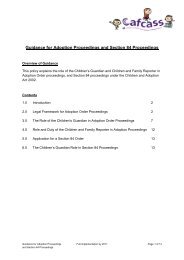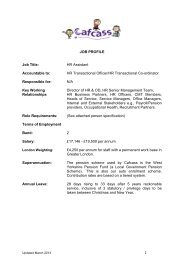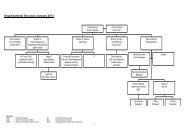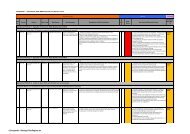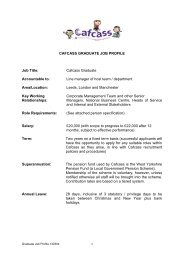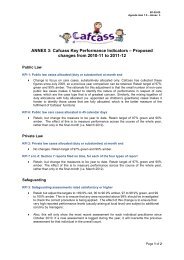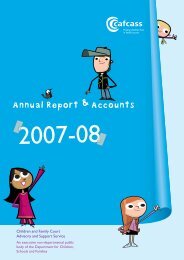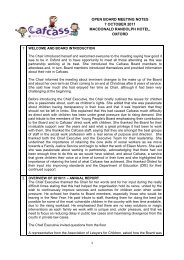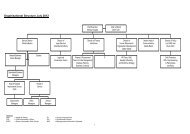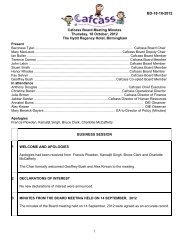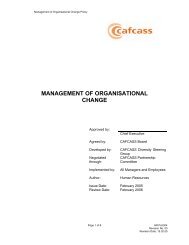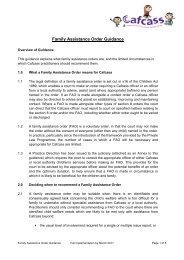Data Protection Act 1998: Subject Access Requests Policy - Cafcass
Data Protection Act 1998: Subject Access Requests Policy - Cafcass
Data Protection Act 1998: Subject Access Requests Policy - Cafcass
- No tags were found...
Create successful ePaper yourself
Turn your PDF publications into a flip-book with our unique Google optimized e-Paper software.
<strong>Data</strong> <strong>Protection</strong> <strong>Act</strong> <strong>1998</strong>: <strong>Subject</strong> <strong>Access</strong> <strong>Requests</strong> <strong>Policy</strong>Contents1. Roles and Responsibilities 22. Scope of the <strong>Policy</strong> 23. The Validity Requirements 34. The Timeframe for Responding 45. Third Party Information Steps 46. Children‟s Information Steps 57. Repeated SARs 68. Steps to be Taken When a Request is Received 69. Appeals 710. Exemptions 7AnnexesAnnex 1Annex 2SAR ChecklistDPA Principles<strong>Subject</strong> <strong>Access</strong> <strong>Requests</strong> <strong>Policy</strong> 1
1. Roles and ResponsibilitiesThe Information Assurance & <strong>Data</strong> Handling (IA&DH) Officer is the designated <strong>Data</strong> Controllerand has responsibility for ensuring that <strong>Cafcass</strong> complies with the <strong>Act</strong> and liaising with theInformation Commissioner.The Chief Executive and Operational Director(s) have overall responsibility for service delivery.Heads of Service are responsible for:Carrying out appeals;ensuring their service area complies with the <strong>Act</strong>.The Customer Services Team (CST) based in the National Business Centre are responsible for:responding to SARs;providing administrative support for responding to SARs;logging SAR requests on the Request Feedback Log (RFL) and putting the SAR documentstogether.Operational Service Managers are responsible for:providing the CST with all requested case data and additional information to enable the CSTto complete the SAR process;maintaining data systems within their offices ehich meet <strong>Cafcass</strong> requirements;ensuring that practitioners, support staff and self employed contractors (SECs) are aware thatinformation may be disclosed by <strong>Cafcass</strong> to individuals; andensuring that all data processed by SECs on behalf of <strong>Cafcass</strong> are processed in accordancewith <strong>Cafcass</strong> policies, and returned to <strong>Cafcass</strong> as soon as possible after the SEC completeswork on a case.2. The Scope of the <strong>Policy</strong>2.1 The policy complies with the <strong>Data</strong> <strong>Protection</strong> <strong>Act</strong> <strong>1998</strong> (“the <strong>Act</strong>”) and applies to all requestsfor “information” (defined below), referred to as “SARs” (subject access requests) received by<strong>Cafcass</strong>. The policy requires compliance with the <strong>Data</strong> <strong>Protection</strong> Principles. It does not applyto requests for personal data which are made to <strong>Cafcass</strong> by its employees or by selfemployed contractors (SECs); such requests must be forwarded to HR.Information covered by this policy2.2 “Information” in this policy means personal data. Personal data are all data relating to a livingindividual who can be identified:from the data; orfrom the data and other information that a data controller possesses or is likely to possess<strong>Subject</strong> <strong>Access</strong> <strong>Requests</strong> <strong>Policy</strong> 2
2.3 Information includes any expression of opinion about that individual and any indication of theintentions of <strong>Cafcass</strong> or any other person in respect of that individual.2.4 Sensitive personal data must be treated with special caution. This is defined by the <strong>Act</strong> asbeing information that relates to:a. Race or ethnic origin;b. Religious beliefs;c. Political opinions;d. Membership of a trade union;e. Physical or mental health or condition;f. Sexual life;g. The commission or alleged commission of any offence;h. Any proceedings for any offence committed or alleged to have been committed and thedisposal of such proceedings or the sentence of any court in such proceedings.2.5 All such information processed by <strong>Cafcass</strong> is covered by the <strong>Act</strong>, regardless of what form ittakes, e.g. electronically recorded or handwritten.3. The Validity Requirements3.1 For a request to be valid, the following requirements must be met.1) A SAR must be in writing.2) The applicant must pay a £10 fee 1 though this can be waived in exceptionalcircumstances, e.g. for a child or unemployed person.3) Unless the practitioner allocated to the family court case in which the person makingthe request is involved, knows the applicant, 2 proofs of identity are needed: (1) IDwith a photo and signature e.g. passport, and (2) ID with a name and address, e.g. arecent utility bill.4) Any further information that is reasonably required to assist <strong>Cafcass</strong> in locatinginformation relevant to the SAR.The above are all covered in template letter 1.SARs by an agent3.2 <strong>Cafcass</strong> is obliged to comply with a SAR made by an agent on behalf of an individual wherethere is sufficient evidence that the individual has authorised the agent to make the request.Where the request comes from a solicitor who is acting for the person making the request, itcan be assumed that the solicitor has authority. The fee will still be payable, but it will notusually be necessary to require identification.What does an applicant receive?3.3 Applicants will receive a permanent copy of their information 2 , unless they agree otherwise.The copy provided must be legible, so may need to be typed if handwritten hand written1 Cheques are payable to <strong>Cafcass</strong>. Complete a form MR1, attach the cheque and send to Finance. Payments are coded as160660.2 Unless an exemption applies<strong>Subject</strong> <strong>Access</strong> <strong>Requests</strong> <strong>Policy</strong> 3
ecords are hard to read, and anything obscure must be explained (e.g. technical terms oracronyms).3.4 There are other requirements in the <strong>Act</strong> (e.g. an applicant must be told why <strong>Cafcass</strong> isprocessing the data, and where it comes from). Those requirements are covered by thetemplate letter 4.4. Timeframe for Responding4.1 The <strong>Act</strong> requires that the full response must be sent to the applicant promptly, but in any eventwithin 40 calendar days from the date on which the full request was made. NB. this means40 days after the applicant has complied with The Validity Requirements.5. Third Party Information Steps5.1 Third party information means information about another individual or professional, includinginformation which identifies that individual as being the source of information sought by theapplicant.5.2 <strong>Cafcass</strong> should consider carefully before disclosing third party information, including namesand addresses of other service users and staff, contact telephone numbers and emailaddresses. The following steps must be taken.Step 1: Where third party information is distinct from another person’s data5.3 See if it is possible to remove the third party‟s information/identity from the page, leaving theapplicant‟s information intelligible. If so, the applicant‟s information can be disclosed withoutthe third party information.Step 2: Where third party information relevant to a SAR is not distinct from another person’sdata5.4 If removing the third party‟s information would make the applicant‟s information unintelligible,<strong>Cafcass</strong> is not obliged to disclose it unless:1) It is reasonable in all circumstances to comply with the request without the consent of thethird party; or2) The third party consents to the disclosure.Step 3: Is it reasonable in all the circumstances to disclose without consent of the third party?5.5 The <strong>Act</strong> sets out the factors for <strong>Cafcass</strong> to consider when determining whether it is reasonableto disclose third party information without consent:1) Is any duty of confidentiality owed to the third party? This may apply for example ifinformation was provided by the police, who asked for it to be kept confidential.2) Have any steps been taken to seek the third party’s consent?3) Is the third party capable of consenting (e.g. too young)?4) Has the third party expressly refused?<strong>Subject</strong> <strong>Access</strong> <strong>Requests</strong> <strong>Policy</strong> 4
5.6 In addition, consideration should be given to any other factors which may make itunreasonable to disclose without consent. For example, would the disclosure place the thirdparty at risk? NB. The possibility that a local authority social worker may have to deal with acomplaint about information they provided to <strong>Cafcass</strong> is not a reason not to disclose thosedata.Step 4: Should the third party’s consent be sought?5.7 Consent should not be sought if there is good reason to believe that the third party would beunlikely to consent, because the relationship between the two individuals is acrimonious or theinformation was given in confidence, or if contacting the third party would requiredisproportionate effort (e.g. because they have moved and <strong>Cafcass</strong> does not have the newaddress). Clearly, this will not apply if the third party is a professional.5.8 If seeking consent, use template letter 3.Step 5: If consent is refused and it is not reasonable to disclose5.9 If consent is refused and it is not reasonable to disclose the information, the <strong>Act</strong> still requiresdisclosure as much of the information as can be communicated without revealing the thirdparty‟s identity. This may be done either by omitting names or other identifying details or byotherwise anonymising the information. Staff must be aware that one of the exemptions insection 10 may apply.5.10 At times it will be difficult for <strong>Cafcass</strong> to determine on its own whether one of the steps aboveapply. Unless confident that none of those circumstances apply (for example, because theperson making the SAR already knows about the data), <strong>Cafcass</strong> should approach the thirdparty to seek their consent to the disclosure.6. Children’s Information Steps<strong>Requests</strong> from children6.1 Children who have capacity to make their own SAR have the same rights as an adult. A childwho has reached the age of 12 is generally presumed to have such capacity, though thispresumption may be rebutted by the CST after discussion with the Operational ServiceManager. If in doubt, seek advice from <strong>Cafcass</strong> Legal.<strong>Requests</strong> made on behalf of children6.2 If a request for disclosure of a child‟s information is received from an adult, the followingissues must be considered:1) Does the child have capacity? If the child has capacity, the adult should be informed that<strong>Cafcass</strong> will only respond if the child makes a SAR, and template letter 2 is sent.2) If the child lacks capacity, does the adult making the request have parental responsibility?If not, the request must be refused and template letter 2 is sent.3) If the child lacks capacity and the adult making the request does have parentalresponsibility, the request may still be declined if <strong>Cafcass</strong> assesses that disclosure wouldnot be for the benefit of the child. This may arise, for example, where these adults withparental responsibility are in conflict with one another in court proceedings. Again, if thisapplies template letter 2 is sent.<strong>Subject</strong> <strong>Access</strong> <strong>Requests</strong> <strong>Policy</strong> 5
7. Repeated SARS7.1 <strong>Cafcass</strong> is not obliged to comply with a SAR from an individual if the request is similar oridentical to a request from the individual that <strong>Cafcass</strong> has already complied with. Thisexemption will not apply if a reasonable interval has elapsed between the two requests andfurther information has been processed since the first request. Before withholdinginformation on this ground, advice should be sought from the IA&DH Officer or <strong>Cafcass</strong>Legal.8. Steps to Take When a Request is Received8.1 <strong>Act</strong>ion for the local office:1) If a request is made orally, the applicant must be asked to put the request in writing andtold that if any written request will be forwarded to the Customer Services Team (CST).2) If a SAR is received by email it must be forwarded the same day; if it is a hard copy letter itmust be date stamped, then scanned and sent the same day, to CST atcustomerservices@cafcass.gsi.gov.uk.8.2 Steps to be taken by CSTOn receipt of a written SAR, CST must:1) Check whether the request meets the Validity Requirements. If not, missing itemsmust be requested.2) Once it is confirmed that the request meets the Validity Requirements, if it relates to achild‟s information take the Child‟s Information Steps.3) If the SAR is to proceed, log the request on the Request Feedback Log (RFL) sectionof CMS. The Request ID number is to be used in all correspondence on the templateletters.4) Create a new file (called the „SAR file‟) to file anything that needs to be kept for therecord. The first item to include on the file is the checklist in Annex 1. It is veryimportant to include a note of all decisions made in relation to the SAR, particularlywhether all information has been included or not and for what reasons. The SAR fileshould be kept secure by the CST.5) Send the applicant an acknowledgment within 7 calendar days from the date on whichthe valid request was received: template letter 1.6) Along with the Service Manager and, if relevant, the FCA who worked on the case,identify and secure all information which may be relevant to the SAR. Obtain therelevant file(s), either by accessing on ECF or by obtaining the hard copy file from thelocal office or archive. If the proceedings are still ongoing, the local office should beasked to send a copy of the file to CST.7) If a complaint has previously been made CST should check the RFL to assess whetherany relevant information is held there.<strong>Subject</strong> <strong>Access</strong> <strong>Requests</strong> <strong>Policy</strong> 6
8) Consider whether any of the relevant information fits an exemption and if so, note theexemption on the SAR file together with an explanation of why it applies.9) If the applicant‟s information is linked to third party information, apply the Third PartyInformation Steps. If it is questionable whether certain information should be disclosed:(a) Check with the relevant Service Manager in the first instance; and(b) If it is still questionable, seek advice from the IA&DH Officer or from <strong>Cafcass</strong> Legal10) The response must be sent within the Timeframe for Responding. Before the time limithas expired, consider any replies from third parties or <strong>Cafcass</strong> National Office, thenmake a final decision on information to be disclosed. Record your decision in writingfor the file. This can be achieved by following the checklist at Annex 1.11) Photocopy the data to be disclosed.12) Send template letter 4 together with the disclosable information. The response must besecurely packaged, particularly for addresses abroad. Envelopes and packages mustalways be marked „Private and Confidential‟ and „addressee only‟. A postal methodwhere the delivery of the response is „recorded‟ should be used such as Secure DX.13) A full copy of all disclosed information must be kept on the SAR file for futurereference.8.3 Copies of all responses to SARs must be placed on the SAR file. SAR files can be destroyedafter 2 years after the date of response to the request.9. Appeals9.1 An individual who remains dissatisfied with the response to a SAR may appeal in writing tothe Operational Area Head of Service via the CST.9.2 CST should acknowledge the appeal on behalf of the Operational Area Head of Service within5 calendar days of receipt by sending template letter 5.9.3 The Operational Area Head of Service will:10. Exemptions1) <strong>Access</strong> the relevant SAR documents, this will be in the form of a hard copy case filefrom CST or otherwise accessing an electronic file on ECF.2) Review all material on the file and decide whether the initial <strong>Cafcass</strong> response should berevised. If it should be revised, the Operational Area Head of Service will inform theCST of any revisions to the SAR who will in turn action the decision, ie the disclosure ofadditional documents to the service user.3) Respond to the applicant with <strong>Cafcass</strong>‟ appeal decision within 40 calendar days ofreceiving the appeal, sending template letter 6. The letter will state that either (1) furtherinformation is disclosable; or (2) that the original response was appropriate and that nofurther data is disclosable.4) Return the SAR File, containing a copy of the response, to CST.<strong>Subject</strong> <strong>Access</strong> <strong>Requests</strong> <strong>Policy</strong> 7
10.1 In certain limited circumstances the <strong>Act</strong> allows information to be withheld from an applicant onthe grounds that it is exempt. If an exemption applies, a description of the information and thereason for withholding it must be noted on the SAR file.All information in adoption and HFEA proceedings10.2 Any records processed by or on behalf of <strong>Cafcass</strong> (including reports) in relation to adoptionproceedings, or an application for a parental order under the HFEA, are automatically exemptand should never be disclosed.Health information10.3 Information relating to the physical or mental health or condition of the applicant is healthinformation, whether or not the information is contained in a medical report.10.4 Health information may be exempt from SARs if disclosure would be likely to cause seriousharm to the physical or mental health or condition of the applicant or any other person(including a member of staff).10.5 It is important to note that CST does not decide whether the disclosure would cause seriousharm; that decision is for the appropriate health professional. „The appropriate healthprofessional‟ is the health professional who is currently, or was most recently, responsible forthe clinical care of the individual.10.6 Advice should be sought from <strong>Cafcass</strong> Legal before deciding to apply this exemption.Social Work Exemption10.7 Any information processed by <strong>Cafcass</strong> or its practitioners in family proceedings is regarded associal work data under the <strong>Act</strong>. Such information may not be disclosed if the disclosure wouldprejudice the carrying out of social work by reason of the fact that it may cause serious harmto the applicant or any other person (including a member of staff).10.8 The social work exemption is not a blanket one and it is unlikely ever to apply to allinformation on a file. Only the information that it would prejudice the carrying out social workby reason of the fact it may cause serious harm to the applicant or any other person (includinga member of staff) would be covered. This exemption is potentially wide ranging but must beconsidered on a case-by-case basis and it is expected that it will be applied only veryinfrequently. Advice should be sought from <strong>Cafcass</strong> Legal by the CST before deciding that itcan be applied.10.9 <strong>Cafcass</strong> has agreed with its sponsor Department that if a social work exemption is applied,the applicant will be informed.Crime and taxation10.10 If <strong>Cafcass</strong> has obtained a criminal record or other information from the police, the CrownProsecution Service (CPS) or the Probation Service, <strong>Cafcass</strong> must not disclose thisinformation if disclosure would prejudice the functions of the police, CPS or Probation Servicein relation to the prevention or detection of crime or apprehension and prosecution ofoffenders.10.11 <strong>Cafcass</strong> are bound by the terms of the Association of Chief Police Officers (ACPO) protocol.Police information will only be used for the purposes of, and preparation for, the current<strong>Subject</strong> <strong>Access</strong> <strong>Requests</strong> <strong>Policy</strong> 8
proceedings. <strong>Cafcass</strong> are not permitted to give a copy of police documentation to any of theparties or their legal representatives10.12 This exemption is likely to apply in rare cases only as the above agencies are unlikely torelease information to <strong>Cafcass</strong> if there is a risk of prejudice in carrying out these functions.However where any risk is identified and the applicant would not already have a copy of theinformation, the agency that generated it should be consulted immediately about whether theyconsider this exemption applies.Educational records10.13 Information contained in an educational record are exempt from SARs where:disclosure is likely to cause serious harm to the physical or mental health or conditionof the child or any other person, orthe information consists of information as to whether the child is being or has beenabused, or may be at risk of child abuse.10.14 In practice this exemption is only likely to be used in rare cases as in most instances where itcould apply, the social work exemption will probably be applicable. Advice should be soughtby the CST from <strong>Cafcass</strong> Legal before applying this exemption.Legal professional privilege10.15 Information in respect of which a claim to legal professional privilege could be maintained inlegal proceedings, is exempt. All communications between solicitor and client are exemptfrom SARs. This means for instance:(i)(ii)if a <strong>Cafcass</strong> practitioner requests legal advice from <strong>Cafcass</strong> Legal, both the requestand the advice are confidential and should not be disclosed; andall advice and requests for legal advice passing between a Children‟s Guardian andtheir solicitor or the child‟s solicitor are also confidential and should not be disclosed. Ifin doubt, seek advice from <strong>Cafcass</strong> Legal.10.16 The <strong>Cafcass</strong> record keeping policy ensures that all legal advice is contained in a clearlymarked section of the case file. Information kept here should not be disclosed.Owner Jasvinder Jassal Issued September 2012Approved by (CMC) Version no: 4.0Next review date September 2013 Ref:©2007 CAFCASS<strong>Subject</strong> <strong>Access</strong> <strong>Requests</strong> <strong>Policy</strong> 9



